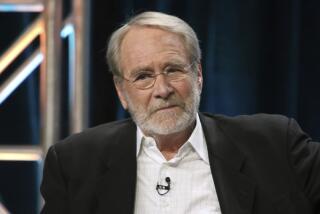Richard Mudd, 101; His Grandfather Treated John Booth
- Share via
Dr. Richard D. Mudd, the patriarch who led a family crusade to overturn the conviction of his grandfather, Dr. Samuel A. Mudd, for aiding Lincoln assassin John Wilkes Booth, has died at 101. Mudd, who took his cause to presidents, senators and the public and never gave up, died May 21 in his Saginaw, Mich., home of causes associated with old age.
Even without its quixotic champion, the cause continues. In September, the U.S. Circuit Court of Appeals for the District of Columbia is scheduled to hear a case Mudd filed a decade ago contesting jurisdiction of military tribunals.
Although Mudd and 20 other members of the more than 400 descendants of Samuel Mudd based their case on events that occurred 137 years ago, the outcome of the pending litigation has relevance in light of President Bush’s decision to hold military tribunals for those accused of involvement in the Sept. 11 terrorist attacks.
The Mudd family saga began at the end of the Civil War, on April 14, 1865, a Good Friday, when President Lincoln went to the Ford Theater in Washington, D.C., and was shot at close range by actor Booth, who then leaped from the president’s box to the stage, breaking his leg.
About 4 a.m. the next morning, Booth and accomplice David Herold rode up to the Bryantown, Md., farmhouse of Dr. Samuel Mudd. Although he was a Confederate sympathizer and knew Booth, Mudd failed to recognize him, descendants claim, because the young actor wore a stage beard. Mudd set the broken leg, fed the two men and put them to bed while he had his handyman make crutches. In the afternoon, he sent them on their way.
Mudd, his grandson always insisted, learned of the assassination only while making rounds that Saturday. He told a relative the next day at church that he had aided two strangers and to report the encounter. He answered Army officials’ questions over the next two weeks and gave them Booth’s discarded boot with “J. Wilkes” written inside. Hunted down, Booth was shot to death in a tobacco barn near Port Royal, Va., on April 26.
Arrested for conspiracy, Mudd was tried by the Hunter Commission, a military body created by President Andrew Johnson to address the Lincoln assassination. On June 29, 1865, the commission found the doctor guilty of “receiving, entertaining, harboring and concealing” Booth and another man “with the intent to aid, abet and assist them in escaping from justice after the assassination.”
Three men and a woman were hanged in the conspiracy case, but Mudd escaped death by one vote. He and three others were sentenced to life in prison. Mudd was sent to a federal prison in the Dry Tortugas, 65 miles off the tip of Key West, Fla. After he thwarted an 1867 yellow fever epidemic on the island, all 299 surviving prisoners and guards petitioned Johnson to pardon Mudd, a pardon and commutation of sentence granted Feb. 8, 1869.
Weakened by the disease himself, Mudd returned to his farm and his medical practice but died of pneumonia in 1883 at the age of 50.
Richard Mudd, born Jan. 24, 1901, in a Washington, D.C., that was still skittish about Civil War memories, took up his quest at 17. Curious because neither his physician father nor other close relatives ever mentioned his grandfather, the youth one day discovered in the family library a book his Aunt Nettie had written about “Dr. Sam.”
As he pursued degrees in history and medicine at Georgetown University, Richard Mudd became determined to clear the name of the famous skeleton in his family closet. Presidential pardon wasn’t good enough; he wanted the conviction overturned and the record corrected.
“I knew I was going to be a doctor, and here was a doctor setting a man’s broken leg and getting put in prison for it,” he told The Times in 1991. “I just couldn’t get away from it.”
Mudd was a flight surgeon in the Army Air Corps, later the Air Force, in both World War II and Korea and worked as an industrial physician at several General Motors automobile plants.
When he was 50, he published a 22-year effort, the two-volume, 1,465-page “Mudd Family of the United States.” Continuing to update the work, he found in his extensive genealogical research that the family, which was of English origin, with roots in America going back to 1665, tallied 21 Mudds who fought in the American Revolution, and, uncannily, another 21 who fought for the Union and 21 who fought for the Confederacy in the Civil War. He also found 50 doctors, including his grandfather, his father and himself, and such well-known relatives as television newsman Roger Mudd.
As he studied the family, Richard inspired other members to join him in his quest to overturn the conviction of Samuel Mudd. His first cousin, Louise Mudd Arehart, who died March 11 at age 84, succeeded in having “Dr. Sam’s” Maryland home added to the National Register of Historic Places in 1983.
Richard devoted himself to the grandfather’s reputation. He distributed thousands of “Save Dr. Mudd” bumper stickers and T-shirts, petitioned the Postal Service for a Dr. Mudd stamp and appeared on the TV quiz show “To Tell the Truth.”
With somewhat more success, he wrote legislators and top politicians. His efforts persuaded the state legislatures of Maryland, Michigan, Massachusetts, Oklahoma and Florida to declare Samuel Mudd innocent of conspiracy.
In 1979, President Carter wrote him a two-page letter supporting his position about Samuel Mudd’s innocence but adding that regrettably he “had been advised [that] the findings of guilt and the sentence of a military commission that tried Dr. Samuel Mudd are binding and conclusive judgments and there is no authority under the law, by which, I, as president, could set aside his conviction.”
In 1987, President Reagan in his own note echoed a president’s legal inability to change a military court ruling, and commented: “In my efforts to help, I came to believe as you do that Dr. Samuel Mudd was indeed innocent of any wrongdoing.”
Finally, in 1992, Mudd applied to the Army Board for Correction of Military Records, arguing that his grandfather was innocent and that the military Hunter Commission had lacked jurisdiction over the civilian doctor.
The board said it had no authority to decide guilt, but agreed that the 1865 commission had lacked jurisdiction and urged the Army to set aside Samuel Mudd’s conviction. The Army refused, and Richard Mudd and his relatives sued. After a couple more setbacks in the trial court and with the Army, the case is now before the federal appellate court--without its instigator.
The crusading Richard Mudd, who abandoned handball at age 90 but continued daily exercise sessions for years after that, regularly led history tours to the Dry Tortugas, where a plaque has honored his grandfather since 1961.
He wrote a dozen scientific papers and books.
He is survived by six of his seven children, 35 grandchildren and more than two dozen great-grandchildren.
More to Read
Sign up for Essential California
The most important California stories and recommendations in your inbox every morning.
You may occasionally receive promotional content from the Los Angeles Times.













